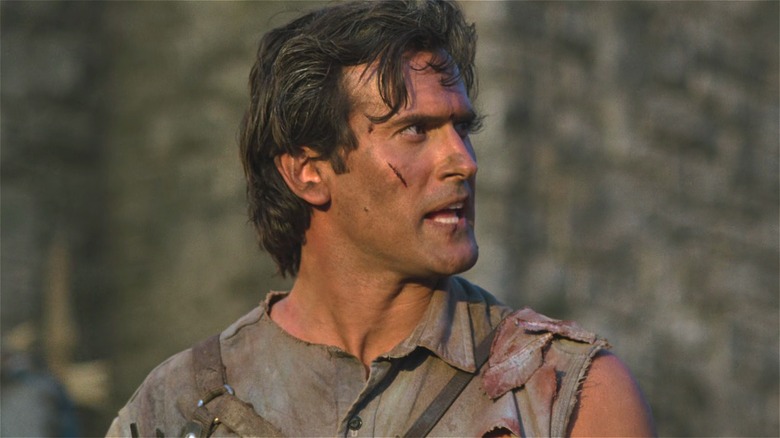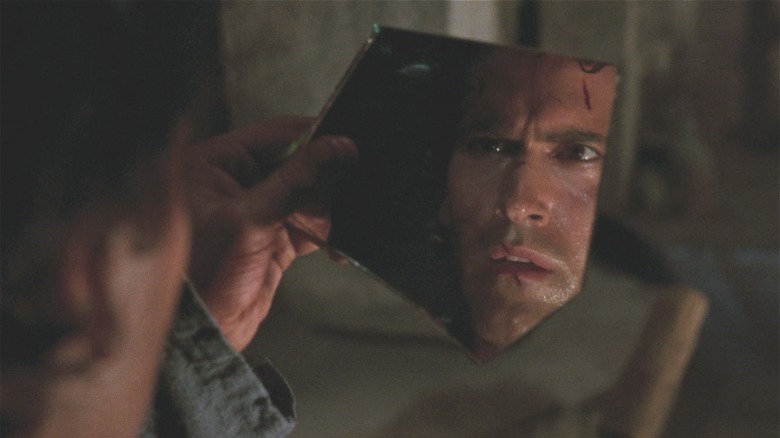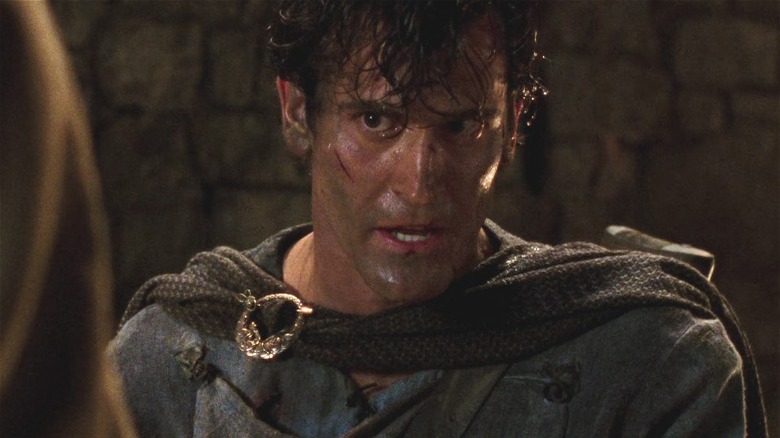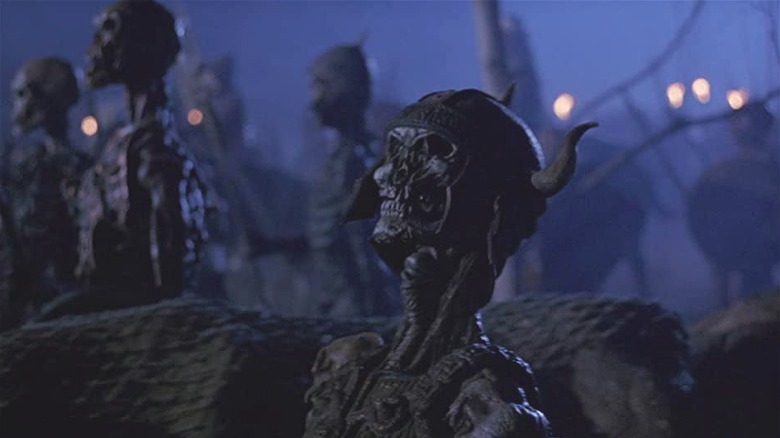The Original Alternate Ending Of Army Of Darkness Is So Much Better
Endings in franchise films might not be definitive, especially in a climate of inevitable reboots/sequels, but they surely cement the tone of the narrative weaved thus far. Sometimes, a director's idea of how a film should end clashes with studio expectations, prompting the release of a theatrical cut that heavily diverges from what was originally intended. This is exactly what happened in the case of Sam Raimi's "Army of Darkness," whose original ending was scrapped by Universal after it was deemed too pessimistic by test-screening audiences. In the event of the film's 30th anniversary this week, I want to talk about the sheer brilliance of this original alternate ending, and why its tongue-in-cheek pessimism works infinitely better for "Army of Darkness" as a whole.
"Evil Dead" was an instant classic when it was released in 1981, and a part of its oddball appeal resided in the way Raimi decided to end the tale on a note of unexpected terror. Right at the brink of freedom, Ash (Bruce Campbell) is attacked by an unseen force, which paves the path for "Evil Dead II," a gorier, campier installment that solidified Raimi's talent as a horror filmmaker. When Raimi decided to go full splatstick in "Army of Darkness," reactions to this tonal swerve were mixed — however, 30 years later, the final film in Raimi's trilogy still slaps, its cheesy S-mart ending notwithstanding. What would be an even better capper for this hilariously bonkers experience is Raimi's original intended ending, in which Ash overshoots his estimate of traveling back in time and ends up in post-apocalyptic London.
Not only is this ending more in sync with who Ash is as a person, but it also perfectly sets up the stage for future franchise installments. Let's dive deeper into the caverns of this downer ending.
A depressing, yet fitting resolution
Ash has always walked the line of unconventionality, both as a survivor and a heroic figure. When Ash faces the Deadites in "The Evil Dead," he exercises empathy as opposed to self-preservation, which heightens the tragedy of personal loss. While it's one thing to witness the deaths of loved ones, Ash undergoes literal hell when he watches them mutate into undead a-holes who toy with his grief. This trauma triggers a shift in him, especially after he is forced to lop off his arm and attach a chainsaw to it in "Evil Dead II." After Ash is hurled through the time portal in "Army of Darkness," he cannot give less of a f*** about conniving Deadites. Treating them as irritants, Ash assumes the mantle of the unwilling hero while being a cocky wisecrack who aims his boomstick straight at King Arthur.
In Raimi's original ending, Ash is given a potion by one of Arthur's wise men, who advises him to ingest no more than six drops. After sealing himself inside a cave with his Oldsmobile Delta 88, Ash counts up to five but is distracted by the sound of debris, leading him to ingest one extra drop on accident. This obviously messes with his time travel, landing him in a world on the brink of extinction. Shocked beyond belief, Ash sinks to his knees dramatically and yells "No! I slept too long!" and the credits roll. This resolution is obviously a depressing one, given how hard Ash fought alongside Arthur's men to defeat the skeleton army just to be able to go home. This ending ensures that Ash is never granted happiness — although cruel, the film's splatstick humor and heightened gags discourage us from taking this as a final nail in the coffin for Ash.
Ash Williams is a hot mess
The reason why the downer ending works better is that it reinforces Ash's tendencies to mess up simple tasks of great importance, established much earlier in the film during the graveyard sequence. Despite being warned that the wrong incantation could spell catastrophe, Ash ends up forgetting part of the phrase, which he hopes to work around by coughing incoherently. This leads to the delightfully animated skeleton army to rise, who poke, drag, and punch Ash before marching towards Arthur's castle with the intention of stealing the Necronomicon-Ex Mortis. The potion mishap in the original ending is more believable than the events of the theatrical cut, where Ash returns to his timeline without any snags, saves the day again (by willingly taking the onus), and smooches a co-worker. Now, this ending surely has its merits: it's cheesy, too good to be true, and portrays Ash as a suave hero who doesn't flinch in the face of danger. Moreover, we also get the inimitable "Hail to the king, baby!," which immediately balances out the film's many flaws (at least in my book).
However, this ending is unfaithful to Ash Williams, the dude who raced his horse away from the Deadites instead of charging headfirst, screaming like a maniac while twisting his face in comical agony. Not only does he fall headfirst into muddy water right after, but he also runs for his life towards the windmill, where he is infamously harassed by tiny versions of himself. Although Ash can absolutely kick ass, he does so only when thrust into tight corners. Our reluctant anti-hero is busier delivering empty monologues, which is promptly called out by Arthur himself. Throughout the trilogy, Ash's cockiness always backfires, which is a thematic thread that is unceremoniously usurped by the theatrical ending.
Why the downer ending is better
In terms of what both endings evoke in audiences, the theatrical version is a cathartic, safer resolution to Ash's arc that adds a saccharine element to the film's worldbuilding. In contrast, the director's cut continues the tradition of unexpected endings that encapsulate the essence of the "Evil Dead" franchise, where not even the final survivor is safe, as danger lurks in every corner. This is exemplified in the first installment where the burning of the Necronomicon does not ensure safety for Ash, who is jump-scared at the last minute, and in "Evil Dead Rise," where the time portal opens and he's stranded in the Middle Ages.
Raimi's ending honors this established tradition, upping the ante of the dire circumstances that Ash finds himself in, while a post-apocalyptic world could have potentially served as the perfect setting for a fourth installment in the film series. Although the franchise keeps growing — with the acclaimed 2013 reboot and the upcoming installment helmed by Lee Cronin — fans were treated to the return of Ash in "Ash vs. Evil Dead," which appropriately ends with a homage to the downer ending, where he wakes up in a post-apocalyptic future. The way in which the series brings everything full circle is immensely satisfying and poetic, especially in terms of who Ash becomes as a person.
Downer ending or not, "Army of Darkness" is a blast from start to finish. Whether you're content with Ash getting the happy ending he deserves in the S-Mart version or his frustration-fueled breakdown in the midst of the world crumbling, the crux of the matter remains: Ash Williams is the ultimate hero of the "Evil Dead" franchise. And one must undoubtedly hail to the king, whose grooviness knows no bounds.



